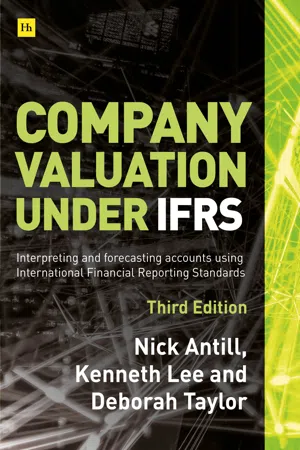
Company valuation under IFRS - 3rd edition
Interpreting and forecasting accounts using International Financial Reporting Standards
- English
- ePUB (mobile friendly)
- Available on iOS & Android
Company valuation under IFRS - 3rd edition
Interpreting and forecasting accounts using International Financial Reporting Standards
About this book
Revised and updated.The influence of International Financial Reporting Standards (IFRS) on accounting across the world is stronger than ever. Most importantly, this stems from the mandatory adoption of IFRSs in many parts of the world, including Europe, Canada, Australia, Brazil and, with some relatively small exceptions, China. Additionally, foreign registrants in the US are also permitted to use IFRS by the SEC. The impact of IFRSs also extends to accounting developments as the IASB and the FASB work closely together to formulate new standards such as those recently issued on leasing and revenue recognition. It is clear that investors, analysts and valuers need to understand financial statements produced under IFRS to feed in to their valuations and broader investment decisions.Written by practitioners for practitioners, the book addresses valuation from the viewpoint of the analyst, the investor and the corporate acquirer. It starts with valuation theory: what is to be discounted and at what discount rate? It explains the connection between standard methodologies based on free cash flow and on return on capital. And it emphasizes that, whichever method is used, accurate interpretation of accounting information is critical to the production of sensible valuations. The authors argue that forecasts of cash flows imply views on profits and balance sheets, and that non-cash items contain useful information about future cash flows - so profits matter.The book addresses the implications for analysis, modelling and valuation of key aspects of IFRS, all updated for recent developments, including:- Pensions- Stock options- Derivatives- Provisions- Leases- Revenue recognition- Foreign currencyThe text also sets out the key differences between IFRS and US GAAP treatments of these issues, in addition to their implications for analysis.A detailed case study is used to provide a step-by-step valuation of an industrial company using both free cash flow and economic profit methodologies. The authors then address a range of common valuation problems, including cyclical or immature companies, as well as the specialist accounting and modelling knowledge required for regulated utilities, resource extraction companies, banks, insurance companies, real estate companies and technology companies. Accounting for mergers and disposals is first explained and then illustrated with a detailed potential acquisition.
Frequently asked questions
- Essential is ideal for learners and professionals who enjoy exploring a wide range of subjects. Access the Essential Library with 800,000+ trusted titles and best-sellers across business, personal growth, and the humanities. Includes unlimited reading time and Standard Read Aloud voice.
- Complete: Perfect for advanced learners and researchers needing full, unrestricted access. Unlock 1.4M+ books across hundreds of subjects, including academic and specialized titles. The Complete Plan also includes advanced features like Premium Read Aloud and Research Assistant.
Please note we cannot support devices running on iOS 13 and Android 7 or earlier. Learn more about using the app.
Information
Table of contents
- Contents
- About the Authors
- Preface to the Third Edition
- Chapter One: It’s Not Just Cash; Accounts Matter
- Chapter Two: WACC – Sixty Years On
- Chapter 3: What Do We Mean By ‘Return’?
- Chapter 4: Key Issues in Accounting and Their Treatment Under IFRS
- Chapter 5: Valuing a Company
- Chapter Six: Special Cases
- Chapter Seven: Modelling Mergers and Acquisitions
- Chapter 8: Conclusions and Continuations
- Further Reading
- Appendices
- Analysis Formulae
- Publishing details